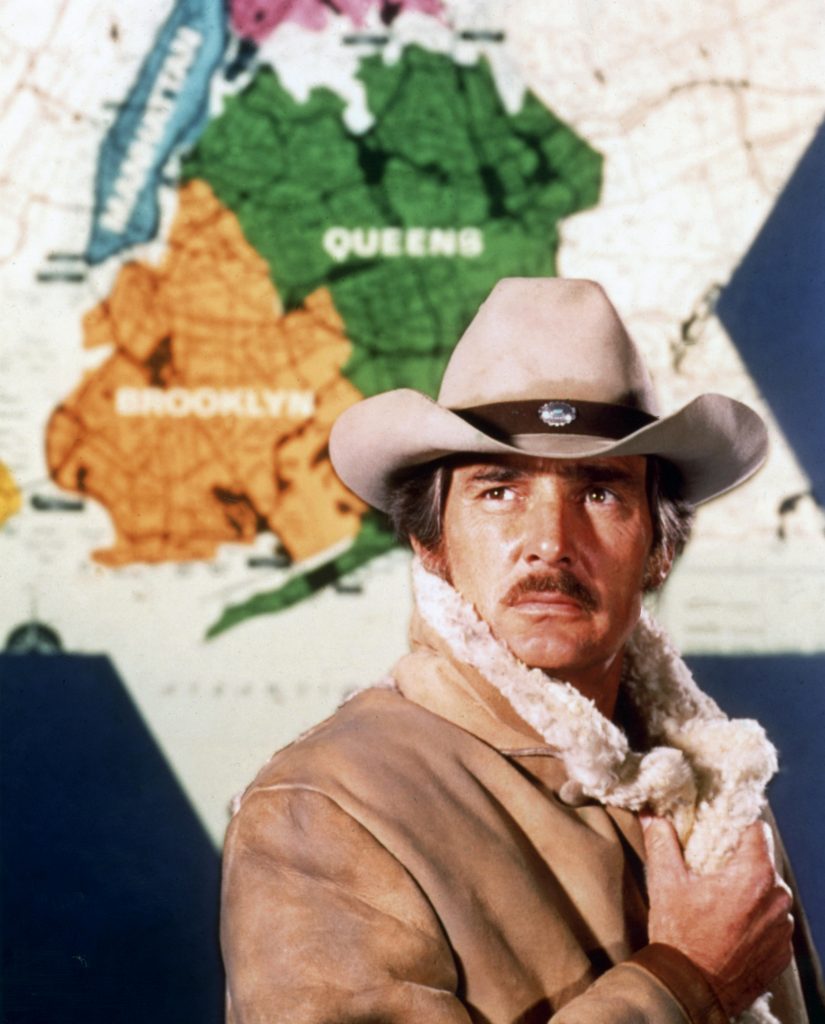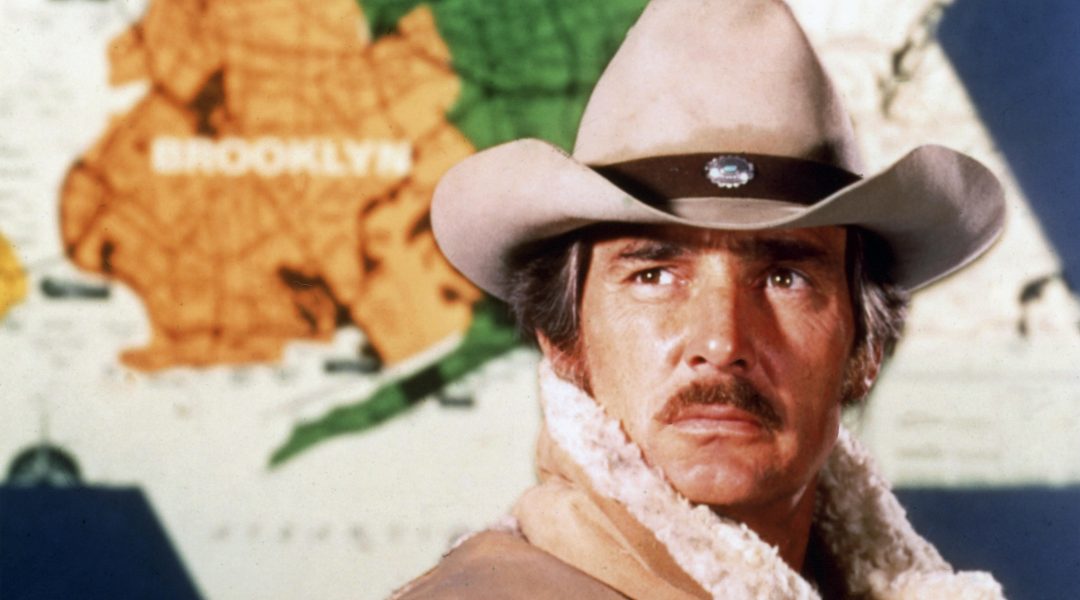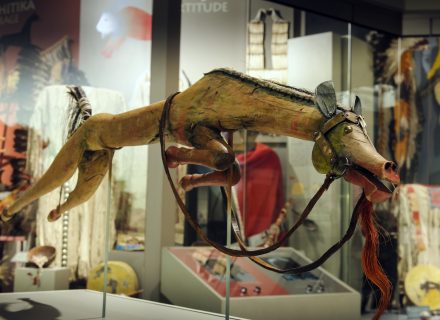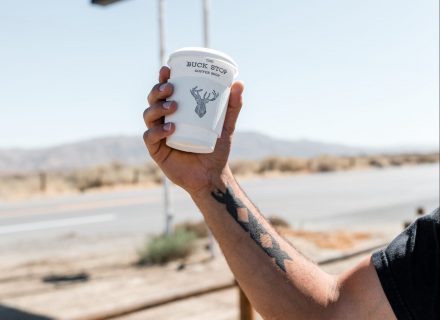New Mexico marshal Sam McCloud taught the NYPD how to round up the bad guys.
East vs. West. City vs. Country. The number of films and TV shows developed out of that culture-clash contrast could fill a cable network. Cliché it may be, but when these stories are done right, they usually work.
Perhaps the most successful example from television is McCloud (1970 – 1977), popularized as one of the rotating features in The NBC Mystery Movie.
Dennis Weaver, as Marshal Sam McCloud, travels from Taos, New Mexico, to New York to learn how police track down bad guys in the big city. When he shows up at the precinct with his cowboy hat and boots, sheepskin coat and bolo tie, he draws incredulous stares from the hard-boiled Manhattan cops. It’s not long before someone calls him “Tex.”
But amusement turns to resentment when McCloud disobeys orders and tracks his own leads, using what Chief of Detectives Peter Clifford (J.D. Cannon) dismisses as “one of the marshal’s barnyard theories,” and solves the case.
Five Memorable McClouds
“Horse Stealing on Fifth Avenue” (1970)
This first-season installment contains the series’ signature shot: McCloud riding a horse through the streets of New York. The scene was a last-minute addition to a script that originally just had the marshal borrowing a policeman’s horse and chasing a suspect through Central Park. That’s why the production didn’t have a permit from the city to shoot the scene, which was achieved by mounting a camera in the back of a station wagon and filming Weaver as he rode through midtown Manhattan. Of course, jaded New Yorkers ignored him completely.
“Encounter With Aries” (1971)
The title alludes to a tattoo of a ram’s head on the arm of a kidnapper in this episode about a famed astrologer’s wealthy wife (Louise Latham) being abducted. She’s locked in a room with a time bomb that will detonate unless the ransom is paid in time, and McCloud is trying to beat the clock. A standard kidnapping story takes a mid-episode twist that surprises McCloud as much as the audience.
“The New Mexican Connection” (1972)
During a stakeout, McCloud recognizes a man wanted for bank robbery back in his old jurisdiction of Taos. He transports him back to New Mexico, but that’s far from the end of the story. The script by series executive producer Glen A. Larson won an Edgar Award from the Mystery Writers of America, perhaps just for the audacity of a climactic chase in which McCloud, back in New York, fights one of the villains on top of a moving stagecoach.
“The Colorado Cattle Caper’ (1974)
One of the delights of the series is McCloud’s clash with assorted city dwellers, but this episode offers a welcome break from that formula. After a tainted beef shipment causes fatalities in New York restaurants, the marshal traces the shipment back to a gang of cattle rustlers in Colorado. The story features two 1970s icons: singer John Denver as a deputy sheriff and Farrah Fawcett as a woman hired by the rustlers to distract the lawmen from their mission.
“This Must Be the Alamo” (1974)
This was the first of four Alamo stories (two with Alamo in the title) in which the police station finds itself under siege — this time from mobsters trying to steal evidence of a bookmaking operation. Among the highlights are Teri Garr’s delightful portrayal of Sgt. Phyllis Norton and the first appearance of Dennis Weaver’s son, Robby, who would also show up in future episodes.
“He was what I’d been waiting for,” Weaver said of the character in an interview with the Television Academy Foundation. “It was absolutely perfect for me.”
To many TV fans, Weaver had already found a perfect role as Matt Dillon’s loyal, coffee-brewing deputy Chester Goode on Gunsmoke. But after nine seasons of limping around Dodge City, he was apparently ready for a new challenge. He played the title role of a California veterinarian in the short-lived series Kentucky Jones (1964) and then co-starred with a black bear on Gentle Ben (1967 – 1969), which was canceled after two seasons. “It was a blessing for me because if it had gone on, I probably wouldn’t have got McCloud,” Weaver recalled.
The character was based on Arizona Deputy Sheriff Coogan, created by Herman Miller for the 1968 film Coogan’s Bluff. The movie was the first collaboration between director Don Siegel and actor Clint Eastwood, whose grim, driven portrayal of Coogan was something of a test run for their next collaboration, Dirty Harry. Miller is credited as series creator on McCloud, and Weaver smoothed out Coogan’s rough edges, making the marshal more palatable for network television.
“He was a guy that had great compassion for the underdog. He believed in justice. If he saw a way of solving a problem, he didn’t go by the book, which irritated the chief to no end,” Weaver said. J.D. Cannon’s portrayal of Chief Clifford alternated between begrudging respect for his maverick trainee (“Send in the sagebrush Sherlock Holmes”) to barely restrained fury. After the marshal ignores yet another directive, Clifford’s exasperated cries of “McCloud!” were so habitual they became a running gag on Mystery Science Theater 3000.
But the New York media embrace the laconic outsider, praising him after a successful closed case as a straight shooter in a place where everyone else has an agenda. Some of that favorable press comes courtesy of newspaper writer Chris Coughlin, played by Diana Muldaur. Though Coughlan appears in 15 episodes as McCloud’s girlfriend, the marshal’s old-school Western charm makes him something of a ladies’ man, which was probably welcome for Dennis Weaver after nearly a decade as unlucky-in-love Chester on Gunsmoke.
Weaver received Emmy nominations in 1974 and 1975 for Outstanding Lead Actor in a Limited Series, and McCloud was a hit straight through to the last of its 46 episodes. In 1989, he reprised the role in The Return of Sam McCloud, in which his character was now a United States senator. He probably didn’t get Chief Clifford’s vote.
You can can stream McCloud on the free Tubi and Frevee websites.
Photography: Courtesy of Alamy.
















